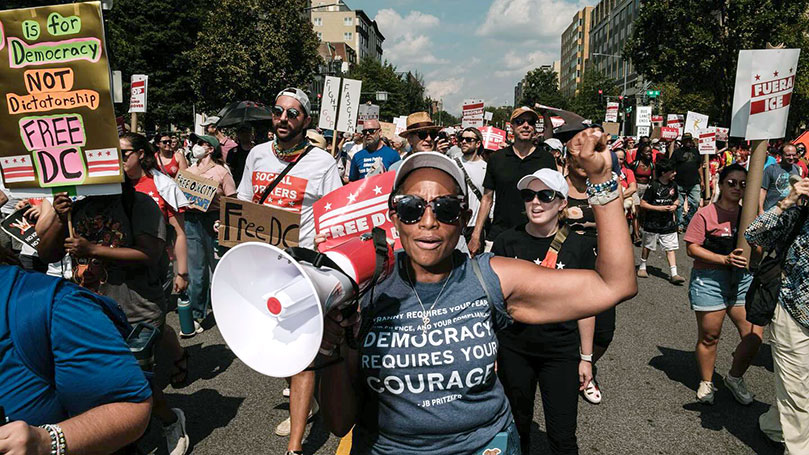
The following report was given to the CPUSA National Committee by the leadership of the African American Equality Commission on October 11, 2025.
The landscape of American politics has shifted dramatically under what some are calling the “Trump 2.0” administration, marked by a pronounced focus on policies that many perceive as hostile to African American communities. The indictment of New York State Attorney General Letitia James serves as a focal point in a broader pattern of attacks, suggesting a strategy aimed at destabilizing advancements made by African Americans. This assault is encapsulated in the administration’s aggressive stance against diversity, equity, and inclusion (DEI) initiatives.
The Anti-DEI Offensive
The systematic dismantling of DEI programs has led to hundreds of thousands of Black women losing their jobs, juxtaposed with the hiring of a comparable number of white men. Some commentators have referred to this as an “affirmative action moment” for white men, underscoring the racial dynamics at play. The repercussions extend beyond federal offices; even major corporations like Target have adhered to this retrenchment by rescinding their DEI commitments. In a city like Minneapolis—where the tragic death of George Floyd ignited global protests—the African American community has initiated a boycott against Target. The backlash has been palpable, resulting in a staggering $12 billion drop in the company’s stock price and significant decreases in customer foot traffic.
This movement showcases the power of collective action. Under the leadership of figures such as Rev. Jamal Bryant from Atlanta, the Black church has played a crucial role in rallying faith leaders for this cause, akin to the mobilization efforts seen during Rev. Jesse Jackson’s Operation PUSH. This resurgence in organized resistance illuminates an essential facet of the ongoing struggle for racial equality and justice.
Impact on Black Media and Education
Recent events, like the assassination of commentator Kirk, have thrown additional shadows over Black creatives and journalists. Many faced job losses or ostracization for speaking out against the shifting political winds. For instance, journalist Karen Attiah was let go from The Washington Post following her unfiltered critique of Kirk’s perspective. Institutions like Historically Black Colleges and Universities (HBCUs) have also been caught in the fallout, facing bomb threats and hostile takeovers by right-wing groups seeking to exploit the situation. Organizations such as Turning Point USA have turned their sights on HBCUs to promote movements like “Blexit,” designed to sway Black youth away from traditional democratic affiliations, all under the financial backing of high-profile individuals supportive of the MAGA agenda.
The intersection of such political movements with larger societal issues culminates in the rise of technologies that further threaten vulnerable communities. The proliferation of artificial intelligence has brought challenges that disproportionately impact Black neighborhoods. The establishment of AI data centers, fueled by unsustainable energy practices, exacerbates existing environmental injustices. For example, Elon Musk’s xAI corporation has faced grassroots opposition in Memphis, where the health outcomes for local residents have dramatically worsened due to toxic emissions linked to AI operations. The parallels to Louisiana’s “Cancer Alley” serve as a grim reminder of the stakes involved in the current struggle against corporate greed masked as technological advancement.
A Political Climate of Occupation
Beyond economic and technological assaults, the MAGA administration’s militarized incursions into cities governed by Black mayors highlight a nefarious strategy aimed at instilling fear among these urban populations. From Los Angeles to Chicago, where local leadership is seen as a threat, ICE agents and military forces have employed tactics more fitting of a police state. Recent raids on residences in South Chicago demonstrate this troubling trajectory, as families—many of whom are immigrants—face separation and psychological terror simply for being part of marginalized communities.
This orchestrated campaign is not just about enforcement; it’s designed to maintain power through fear, essentially creating a state of occupation within these cities. The actions of the Trump administration have sparked outrage and mobilization across various sectors, calling for a comprehensive reevaluation of how political resources and alliances are formed in communities of color.
The African American community is being called upon to push back against these attacks with renewed vigor. The “No Target” campaign serves as an exemplary model, reminding corporate entities that there are repercussions for participating in racial injustice. Upcoming events like Black History Month 2026 are poised to emphasize the ongoing struggles faced by African Americans, rallying communities around the fight for genuine democracy and equality.
Image: People march to demand an end to Trump’s occupation in D.C. by Free DC / @billleephotography (Facebook)



